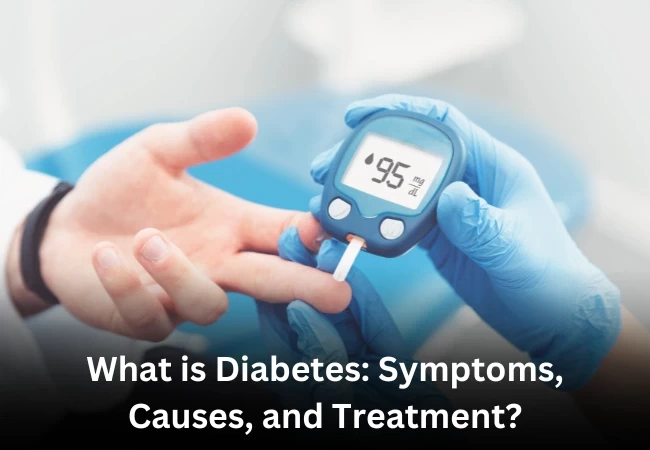Diabetes mellitus is a condition where your blood sugar is too high. This happens because your body does not make enough insulin or cannot use it well. Insulin will help move sugar from your blood into your cells for energy. Without enough insulin, sugar stays in your blood which will harm your nerves, eyes, kidneys and other organs. Read further below to know what is diabetes and what steps to take to manage it properly to keep you healthy.
Diabetes is nothing but the disease when your blood sugar (glucose) levels are too high. This happens because your pancreas does not make enough insulin or your body does not use insulin properly. Insulin is important to help sugar get into your cells for energy. Diabetes can affect anyone and most types are long term conditions. However, you can manage diabetes with medicine and lifestyle changes to stay healthy.
Check out below to know what are the symptoms of diabetes.
The symptoms of type 1, type 2, and type 1.5 (LADA) diabetes are similar but they appear fast in type 1. In type 2, symptoms appear more slowly. People with type 2 diabetes usually have tingling nerves and sores that heal slowly. If type 1 diabetes is not treated, it will lead to diabetic ketoacidosis which is a serious condition with high levels of ketones in the body. This is less common in other types of diabetes but can still happen.
The general symptoms of diabetes are as follows:
Apart from the general symptoms of diabetes, men having diabetes might have:
Women having diabetes can have symptoms like:
Most people with gestational diabetes do not have symptoms. Doctors usually find it during a routine blood sugar test or oral glucose tolerance test between the 24th and 28th weeks of pregnancy. In rare cases, some people with gestational diabetes may feel more thirsty or need to urinate more frequently.
If you want to know what causes diabetes, read ahead. The cause of type 1 diabetes is unknown but scientists know it makes the body attack the cells that produce insulin. They are researching why this happens. You know what is type 2 diabetes, it is caused by the body not making enough insulin or not using it properly. This leads to high blood sugar levels. Type 2 is often linked to following:
Type 2 diabetes often develops slowly and usually affects adults over 40 but it can happen at any age. People with South Asian, African Caribbean or Black Asian backgrounds have a higher risk of getting type 2 diabetes. Hope you understand what is type 2 diabetes and how it affects.
A doctor will diagnose diabetes using different blood tests which are as follows:
Diabetes is a condition that needs careful management and varies from person to person. Here are the main aspects of managing diabetes:
Checking your blood sugar levels will help you know how well your treatment is working. You can use a glucose meter or a continuous glucose monitor (CGM) to do this. Your healthcare provider will help you decide your target blood sugar range.
There are pills that help control blood sugar especially in people with type 2 diabetes or prediabetes. Metformin is a common medication used.
People with type 1 diabetes need to take insulin to manage their condition. Some people with type 2 diabetes also need insulin. There are different types of insulin which can be taken through shots, insulin pens, pumps, or inhaled insulin.
Eating a healthy diet is crucial for managing diabetes. If you use insulin, you will need to count the carbs in your food to know how much insulin to take. Healthy eating can also help you with weight management and reducing heart disease risk.
Regular physical activity helps make your body more sensitive to insulin which is important to manage diabetes.
Additionally, it is important to maintain a healthy weight, blood pressure and cholesterol levels to reduce the risk of heart disease.
Some types of diabetes like types 1 and 1.5 happen for reasons that you cannot control. Others, like type 2 diabetes can be prevented by eating healthier, being more active, and losing weight. You should talk to your doctor about your diabetes risk. If you are at risk, get your blood sugar tested and follow your doctor's advice to manage it.
For consulting the best diabetologist, you can visit EMC hospital which was established in 1985 as a small 50-bed hospital. Over time, it has grown into a top healthcare facility in Kochi with 250 beds and many services. We focus on providing high quality healthcare at a reasonable price and we are dedicated to serving our community well. As a NABH-accredited hospital, we aim to keep improving and be the best multispeciality hospital in Kochi. We want to be a top provider of high quality and patient centered care in the area.


Discover the truth behind common plastic surgery myths. Learn what's real, what's outdated, and how modern procedures truly work.

A step-by-step overview of GI surgery, covering what to do before surgery, what happens in the OR, and how to ensure a strong recovery.

Learn about cancer, its early signs, and prevention tips to lower your risk. Early detection saves lives—stay informed, take proactive steps, and protect your health.

Discover why a skilled pediatrician is essential for your child's growth, development, and overall well-being, from infancy through adolescence.

Discover how dermatology can help tackle acne, slow aging, and treat various skin conditions for healthier, more radiant skin.

Discover common childhood allergies, their symptoms, and management tips. Stay informed to keep your child safe and healthy.

Your liver plays a vital role in metabolism, digestion, immunity, and detoxification. Learn how liver health affects your body and ways to maintain its function.

Strong bones support your body and protect your health. Discover simple diet, exercise, and lifestyle tips to maintain bone strength at any age.

Discover the symptoms, causes, and treatment of hypertensive heart disease. Learn how high blood pressure affects your heart and when to seek medical care.

Learn about chest pain symptoms, causes, and treatments. Know when to seek medical help for a healthier heart.